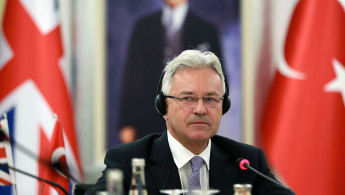UK: 'No evidence Turkey coup was organised by Gulen'
Foreign Office Minister Sir Alan Duncan told the foreign affairs select committee that it wasn't clear how many of the soldiers involved in the foiled coup were connected to Gulen, who Turkey accuses of masterminding the putsch attempt.
"We've asked the Turkish government for this evidence," said the Conservative member of parliament.
"It's very clear that there were many Gulenists involved in the coup, but we don't have the information or evidence to decide [this issue] definitively."
The committee heard that the foreign office - which shares intelligence with Ankara - knows "a lot about individuals" but much less about the organisations to which they belong.
"The nature of that [alleged Gulen-led] organisation is not altogether clear," said Duncan.
"It is mostly hidden, below the radar and complicated to analyse."
The minister's submissions appear to contradict a statement by the Turkish government on its 1,300-page indictment against Gulen, submitted to Washington on Monday.
It is said to contain decisive evidence against Gulen - including flight records and the witness statements of two informants, code-named "Kuzgun" and "Şapka".
The failed 15 July coup was an attempt by the military to seize control of the government, citing a perceived lack of secularism in the government's affairs.
Around 400 people died in the violence leading to swift and severe reprisals by the government.
Approximately 40,000 people were arrested and hundreds of thousands of people lost their jobs for their alleged involvement in an clandestine group Ankara calls the "Fethullah [Gullen] Terrorist Organisation".
Human rights groups have criticised the arrests saying tens of thousands of journalists, opposition politicians and members of Kurdish organisations are being held without evidence.
The UK government has been criticised for its silence on the mass arrests, with many law makers arguing that Saturday's decision to allow UK-based BAE Systems to sell fighter jets to Ankara was unethical.
UK weekly newspaper The Observer also reported that London had sold a total of 330 million pounds sterling ($411 million) worth of arms exports to Turkey since 2015. Around 50 million pounds sterling ($63 million) had been agreed after the coup attempt and government clampdown.
The UK government has decided to maintain good relations with Turkey in stark contrast to its European partners who have condemned the the mass arrests by Turkish security forces.
"The arms deal was the right judgement," said Duncan.
"I accept that the scale of people being arrested is massive and needs to be justified … but we have made it very clear that we need to deepen our bilateral relationship. Turkey is a large and significant economy which cannot be ignored."
When asked if there was any evidence that President Recep Tayyip Erdogan had been made aware of the coup before hand, Duncan denied this possibility entirely.
"I met the prime minister three days after in a bombed out parliament; he gave me a first-hand account of the events - he was still in trauma," said Duncan.
"He had been shot at and jets had flown within yards of him - that doesn't smack of an inside job."



